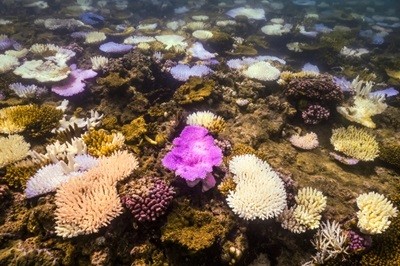Elkhorn coral off the coast of Key Largo, Florida. Credit: Sam Hodge/Alamy
Two years after a record-setting heatwave, scientists have confirmed that two iconic corals that have flourished across Florida’s 560-kilometre-long reef for more than 10,000 years are now ‘functionally extinct’ off the state’s southern coast.
Both the elkhorn coral (Acropora Palmata) and staghorn coral (Acropora cervicornis) survive in tanks and scattered locations across Florida’s reefs, but a study published today in Science suggests that their long-standing role as the primary reef builders off the coast of Florida has come to an end: so few remain that they can no longer play a functional part in the ecosystem1.
“This ecosystem is forever transformed,” says lead author Ross Cunning, a coral biologist at the John G. Shedd Aquarium in Chicago, Illinois. That does not mean scientists are giving up hope on either species, he says, but what scientists and conservationists do from now on “needs to fundamentally change”.
Boiling ocean
Over the past few decades Florida’s corals have been hit repeatedly by bleaching events, which occur when rising water temperatures cause corals to expel the symbiotic algae that provide them with nutrients and colour. But the 2023 heatwave, which coincided with record temperatures that drove bleaching across the globe, hit Florida earlier, faster and harder than anything scientists had seen before.

Coral die-off marks Earth’s first climate ‘tipping point’, scientists say
Ocean temperatures registered above 31 °C for nearly 41 days — up to four degrees above normal in places. This created heat exposures on the reef that were 2–4 times higher than previous records. Although many corals survived the event, mortality among Acropora corals ranged from 98–100% across much of the reef, from Dry Tortugas National Park in the west through the Florida Keys to the east. In the area off the coast of Miami, and further north, more than 60% of the corals survived.
The 2023 heatwave was the nail in the coffin not just for Acropora corals, but also for more than two decades of conservation work that has focused primarily on raising these corals in labs and then planting them back in the ocean, says Ken Nedimyer, technical director at Reef Renewal, a conservation organisation based in Tampa, Florida. Most of the corals that the organisation raised and planted over the past two decades are now dead, so Nedimyer says their efforts are now shifting towards other types of corals that have survived the bleaching events, such as brain and star corals, while also working to preserve genetic diversity of Acropora corals and breed those relatively rare individuals that survived.
“We still have some great [Acropora] corals to work with,” Nedimyer says, and there is already evidence that such breeding efforts can help the corals adapt and withstand future heatwaves. “We just haven’t done it at a big scale yet.”